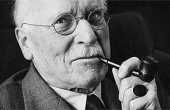Yasmine Allen
A young scholar who enjoys studying and writing about various disciplines including; physics, philosophy, politics, art, Esotericism and Biocentrism.
Contributor I
- Articles
1 - Featured
1 - Comments
6
- Ext. Comments
3 - Processed
1 - Revisions
0
- Topics
3 - Topics Taken
0 - Notes
3
- Topics Proc.
5 - Topics Rev.
0
- Points
511 - Rank
X - Score
214
Latest Articles
Latest Topics
Carl Jung on Synchronicity and the Esoteric.An analysis of C.G Jung’s astounding and provocative thought regarding his book on ‘Synchronicity and the Paranormal.’ Albeit having been the founder of Depth psychology, as the advent of esotericism within the 20th century, Carl Jung’s work not only reaches the depth of the mind but borrows the symbolism prevalent within the occult. This article will elucidate the symbolism of Carl Jung’s ‘Synchronicity and the Paranormal’ wherein Jung’s writing regarding the ‘psyche’ and ‘daemons’ is taken into an analytical approach, analyzing the hidden meaning of Jung’s work on psychology and the paranormal and its relevance to the occult.
|
Devil's and Realist and the OccultConsidering that you may be an avid fan of anime and you’ve seen many an anime in your lifetime, it is possible you might have stumbled upon ‘Devil’s and Realist,’ written by Madoka Takadono. This anime is an essential piece of occult literature, which revolves around the school life of an affluent aristocrat in the 19th century England, William Twining, who in the beginning tries to procure a financially stable position with a full ride scholarship. However, Twining has a secret, he is actually King Solomon, and he doesn’t even know it. King Solomon was the King of Isreal, whose roots are seen in biblical scriptures and in the writings of the occult. Having control over demons with the seal of his ring, he was the ruler of the underworld and the keeper of ancient wisdom. This anime follows the exact story of Solomon with a parallel to a skeptical human boy. Although this anime is pure fiction, it revolves around a provocative topic. Overall, ‘Devils and Realist’ is a tantamount part of occultism, and occultism is inextricable to this series. Focusing on the biblical and esoteric story of King Solomon, this article analyzes the correlation between this anime series and the occult.
|
Mysticism and Carl Jung, an analytical approach to the Esoteric's of C.G JungCarl Jung, a disciple of Sigmund Freud, is revered by psychologists as having founded modern depth psychology. Albeit Jung’s astounding writing regarding psychology, his work was mostly inspired by Esotericism and the religion and teachings of the ancient Gnostics. This article will elucidate the symbolism of Carl Jung’s ‘Synchronicity and the Paranormal’ wherein Jung’s writing regarding the ‘psyche’ and ‘daemons’ is taken into an analytical approach, analyzing the hidden meaning of Jung’s work on psychology and the paranormal.
|
Latest Comments
| Carl Jung on Synchronicity and the Esoteric | |
Hello there, | Carl Jung on Synchronicity and the Esoteric |
It is a great honor to have been your introduction into the world of Carl Jung! You’ve made me most happy and grateful! | Carl Jung on Synchronicity and the Esoteric |
very helpful. | Exploring The Hero's Journey: A Writer's Guide |
Great article, this will help a lot with my writings. | Plot Twists in Fiction: Making a Story Standout |
I found this article to be quite intriguing and informative. The essential question has within this article a satisfying answer, thus sound. I have written many stories online, derived of course–by the mind. Yet I haven’t taken a single creative writings class, but I also have a very fine touch in drawing and math. Why not explore that correlation? Overall great piece. | Are Creative Writers Taught or Talented? |

Thank you very much! My readers mean more to me than anything they will ever know. Sharing the knowledge that one has acquired is the greatest gift, and I shall cherish every present that I give to my dear readers.